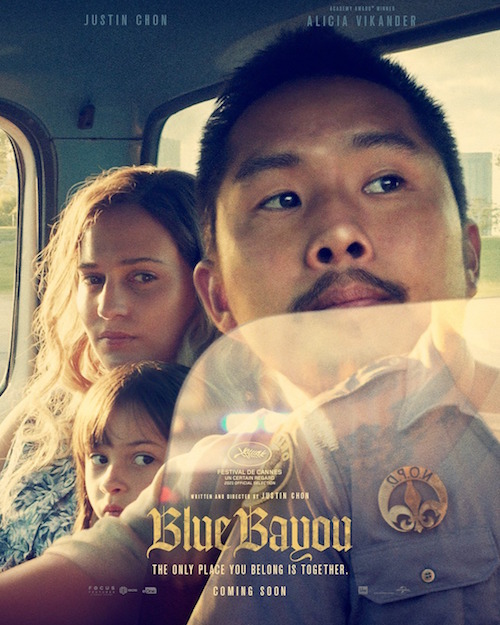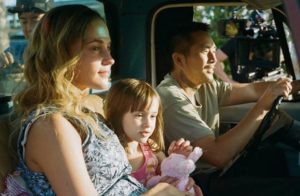While there is no denying the tremendous emotional power at the heart of Blue Bayou, the new drama from writer/director/actor Justin Chon, there is also little in the way of subtlety in the way the film tackles its rather complicated topic of immigration legalese. That however, also proves to be its strength as the sheer force with which the film moves along propels this remarkably compelling melodrama towards its satisfying conclusion.

Chon plays Antonio LeBlanc, a Korean adoptee who has been raised his entire life in the Louisiana bayou. He is married to Kathy (Alicia Vikander) and is step-father to her daughter, Jessie (Sydney Kowalske). As the family struggles to make a better life for themselves and the baby that Kathy is currently expecting, tragedy strikes when an unfortunate series of events leaves Antonio on cusp of deportation from the only country he has ever known. This forces Antonio to come to confront his past and fight for his future and his family.
This past, which involves felony charges for motorcycle theft, have kept Antonio from moving forward with his life as is evidenced in the film’s opening scene wherein he is subjected to a job interview that is doomed once his prior crimes come to light. Add to this dispirited mood, the nagging presence of young Jesse’s biological father, a cop named Ace (Mark O’Brien), who now suddenly wants to be part of the daughter’s life he had unceremoniously abandoned and accosts Antonio and his family in the local supermarket about his visitation rights. This situation rapidly escalates and somehow ends with Antonio being arrested and being flagged for deportation due to a technicality wherein his adoptive parents did not properly formalize his citizenship.

Sydney Kowalske, Justin Chon, and Alicia Vikander in “Blue Bayou.” © Justin Chon.
Enter attorney Barry Boucher (Vondie Curtis-Hall) who lets the couple know of Antonio’s limited options given his criminal record. Around this time, the film’s secondary narrative, that of a Vietnamese American cancer patient named Parker (Linh-Dan Pham) whom Antonio befriends and does a bit of soul-searching with. Add to this Antonio’s momentary return to a life of crime to secure the funds to pay Boucher for his services as well as intermittent flashbacks involving Antonio’s birth mother and a possible reconciliation with his estranged adoptive mother and there is a lot to unpack, to say the least.
The beauty of Chon’s film though is that the act of unpacking all of that material is more rewarding than it is tedious. As photographed by Ante Cheng, the film is a sort of opaque overall homage to the bayou as is the music provided by Roger Suen, which includes Vikander’s haunting rendition of the Roy Orbison/Joe Melson penned song “Blue Bayou” that was made even more famous by Linda Ronstadt.
While there may be more ambition and intention involved with Blue Bayou than is fully realized in the end product, what is produced is a wholly remarkable and rewarding experience that delivers a cathartic emotional, if still basic, exploration of the immigration system.

| Producer: | Charles D. King, Kim Roth, Poppy Hanks, Justin Chon |
| Release Date: | September 17, 2021 (limited) |
| Running Time: | 119 minutes |
| Starring: | Justin Chon, Alicia Vikander, Sydney Kowalske, Mark O'Brien, Randy Austin, Brad Blanchard, Chris Bosarge, Martin Bats Bradford, Adam Brazy, Tracy Brotherton, Ron Centanni, Emory Cohen, Sylvia Grace Crim, Vondie Curtis-Hall, Rhonda Johnson Dents, Divine Prince Ty Emmecca, Alexander Garcia, Renell Gibbs, Jim Gleason |
| User Rating: | |
| Writer: | Justin Chon |
| MPAA Rating: | R (for language throughout and some violence) |
| Director: | Justin Chon |
| Distributor: | Focus Features |
| External Info: | Official Site / Facebook / Twitter / Instagram |
